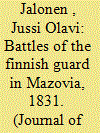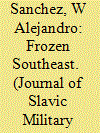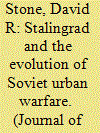|
|
|
Sort Order |
|
|
|
Items / Page
|
|
|
|
|
|
|
| Srl | Item |
| 1 |
ID:
088829


|
|
|
|
|
| Publication |
2009.
|
| Summary/Abstract |
The Russian military units assembled for the punitive expedition against Poland in 1831 included also the Finnish Sharp-Shooter Battalion of the Imperial Guard. The Finnish Guard experienced its hardest battles in the rearguard action against general Skrzynecki's Polish forces in Mazovia in May 1831. Aside the primary records of the Battalion, testimonies of these encounters were also given in the memoirs of Polish officers. The battles in Mazovia were the first time in history when Finnish soldiers had fought and died in service of the Russian Empire, and thus played a part securing the Imperial favor for the Finnish autonomy
|
|
|
|
|
|
|
|
|
|
|
|
|
|
|
|
| 2 |
ID:
088828


|
|
|
|
|
| Publication |
2009.
|
| Summary/Abstract |
Since World War II ended in May 1945, few topics related to the war or its consequences have attracted more attention than the famous Nuremberg War Crime Trials. Eagerly, hundreds of historians have used the trials as a vehicle for demonstrating Germany's collective war guilt and for fingering those individuals, primarily Germans, who were most responsible for Germany's numerous war crimes. On the other hand, far fewer historians have examined the relative "war guilt" of other Axis countries, in particular, the Japanese Empire. This article begins to redress this historical imbalance by providing a virtual 'insiders' view of the Tokyo War Crimes Trials, which were conducted from 1946 to 1948. In addition to exploiting fresh archival materials to reveal unprecedented details about the trials themselves, the article also provides keen insights regarding the political context of the trials, that is, how and why the Allied Powers conducted the trials as they did.
|
|
|
|
|
|
|
|
|
|
|
|
|
|
|
|
| 3 |
ID:
088823


|
|
|
|
|
| Publication |
2009.
|
| Summary/Abstract |
The Republic of Transnistria is a separatist region of the Southeastern European state of Moldova. While not much has changed in this "frozen conflict" since a 1992 short-lived war, the eastwards expansion of the European Union and NATO are slowly bringing Moldova to the attention of Western policymakers. The cornerstone of the separatist cause is the Russian Federation, which serves as Transnistrias protector. Given the 2008 summer in war in Georgia, another so-called "frozen conflict," it is necessary to evaluate how a Russia-backed separatist region in Moldova, accussed of human rights violations and weapons trafficking, fits into the wider discussion of European geosecurity and NATO/West-Russian relations for the immediate future.
|
|
|
|
|
|
|
|
|
|
|
|
|
|
|
|
| 4 |
ID:
088824


|
|
|
|
|
| Publication |
2009.
|
| Summary/Abstract |
Literally thousands of books and many tens of thousands of articles have been published about the Soviet-German War, 1941-1945. While many of these publications addressed military aspects of this struggle, a significant number have investigated a broad range of non-military themes, such as the war's political context and its profound economic and social consequences. Precious few, however, have viewed the war through the prism of wartime life in one of the Soviet Union's many constituent republics or autonomous republics and regions. This article begins filling that historical vacuum by treating the factor of demography in the development of wartime industries in the Komi Autonomous Soviet Socialist Republic (Komi ASSR). By exploiting information contained in hitherto unavailable archival documents, this article reveals unprecedented detail regarding how this republic mobilized its population and resources in support of the Soviet Union's overall war effort. By doing so, its detail also represents a virtual memorial to the personal sacrifices made by all of the nearly half million inhabitants of the Komi ASSR.
|
|
|
|
|
|
|
|
|
|
|
|
|
|
|
|
| 5 |
ID:
088826


|
|
|
|
|
| Publication |
2009.
|
| Summary/Abstract |
This article examines the remembrance of World War I in Slovenia during three distinct periods of the nation's history: 1918-1941, 1941-1991 and 1991 to the present. The work argues that the memory and remembrance of World War I has been categorically underrepresented in the official histories of the last ninety years for a number of political and ideological reasons. Having been tailored to fit a narrative of national liberation and the excising of Habsburg influence during the period of interwar Yugoslavia, World War I was then eclipsed by World War II and most recently independent Slovenia's search for new historical heroes. The effects of this selective remembrance are particularly visible in the changing historiography and the construction or destruction of physical memorials to the Great War in Slovenia. The article argues that the comparatively unknown history of World War I is not unique to Slovenes but is also characteristic of the other successor states of the Austro-Hungarian Empire. The officially neglected remembrance of the Great War in East Central Europe stands in stark contrast to the official efforts of western states to keep that memory alive.
|
|
|
|
|
|
|
|
|
|
|
|
|
|
|
|
| 6 |
ID:
088827


|
|
|
|
|
| Publication |
2009.
|
| Summary/Abstract |
Following Barbarossa, the Axis invasion of the Soviet Union, British strategic assumptions were shattered. In the months of British indecision that followed, the Soviet leadership worked constantly and in a variety of ways to secure British economic and military aid. Eventually Stalin grew tired of Britain's seemingly empty promises of support and gave Churchill the impression that the Soviet Union might choose to seek separate terms with the Nazis. This impression led Churchill and the British finally to commit to concrete commitments of military aid to the Soviet Union, aid which would later play a key role in halting the Axis advance at the Battle of Moscow
|
|
|
|
|
|
|
|
|
|
|
|
|
|
|
|
| 7 |
ID:
088825


|
|
|
|
|
| Publication |
2009.
|
| Summary/Abstract |
Examining Soviet urban warfare at Stalingrad, particularly in comparison to pre-war Soviet doctrine on combat in cities, suggests a number of conclusions about Soviet military performance. Soviet victory was not simply a matter of enormous human sacrifice, but also required winning the production battle with Nazi Germany. The Red Army also had to master the tactics of urban warfare from bitter experience, given the underdeveloped state of Soviet doctrine before the war and lack of relevant experience before Stalingrad. Despite that, the Soviets proved to be highly skilled at urban warfare. Given that fighting in cities requires great initiative and improvisation on the part of individual soldiers and junior officers, the Soviet victory further undermines the outdated conventional wisdom of stolid and faceless Russian soldiers.
|
|
|
|
|
|
|
|
|
|
|
|
|
|
|
|
| 8 |
ID:
088830


|
|
|
|
|
|
|
|